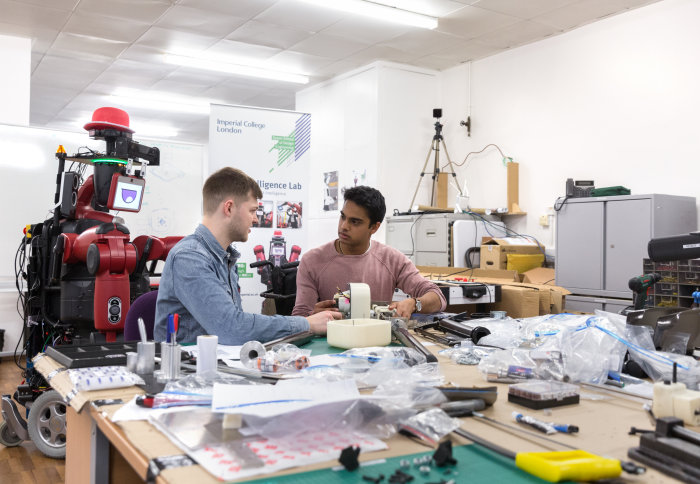Diverse teaching boosted by additional investment from Excellence Fund

Students in the Dyson School and School of Public Health will benefit from more diverse learning experience
Two additional projects are set to receive funding from the Excellence Fund for Learning and Teaching Innovation.
The successful teams have been awarded funds to develop and encourage more inclusive learning and teaching at the College. They will launch alongside three other projects that were funded earlier this year. Each successful project receives up to £50,000 a year.
The Excellence Fund supports education initiatives that challenge students to fulfil their potential. Those receiving funds help to form a community of excellent and innovative teachers who play a key role in promoting good practice and helping the College to deliver a world-class educational experience for all of our students. This year the Fund sought applications from teaching teams that wish to improve the curriculum content by introducing research and innovation themes around diversity, equality and inclusion.
“This funding will shine a light on our own teaching and our own biases and examine what we can do about it, striving for a more equitable, balanced and fair education for our students.” Dr Matthew Harris
Professor Simone Buitendijk, Vice-Provost for Education said: “From the world of robotics, to the principles of public health, our innovative teaching teams continue to transform our understanding of what inclusive teaching should represent.
“By committing themselves to change, both the Dyson School and the School of Public Health are making significant strides forward in contributing to Imperial’s efforts to consider diversity and equality in everything we do, including our research-led teaching.”
Perspectives in Public Health
Project team: Dr Matthew Harris
It is a widely-held belief that researchers from institutions in low-income countries struggle to publish their research, and that the wider academic community pays little attention to it once it is published. Recent research by Dr Harris’ team demonstrated conclusively that, under tightly controlled conditions, English clinicians rated research from low-income countries worse compared to the same research presented as if from higher-income countries.
This deeply entrenched bias can reduce opportunities to understand different perspectives and solutions to global health challenges.
The project will conduct a root and branch review of the reading lists in Imperial’s Masters in Public Health course and will work with module leads and external speakers to ensure that diverse sources are included as much as possible in the curriculum.

The team will also raise the profile of unconscious bias against low-income country research by providing an Implicit Association Test that uncovers hidden biases so that individuals can become aware of their own attitudes. Students will then have the opportunity to enter an essay competition in which they will be challenged to describe a health technology developed by clinicians or researchers in a low-income country that would be of benefit to the UK population if adopted for use in the NHS.
Dr Matthew Harris said: “The Excellence Fund brings to the fore the importance of diversity in our teaching and our research. We all too often rely on scientific research from institutions in the so-call Global North, and research from partners in low and middle-income countries may be unfairly given shorter shrift. However global health requires global perspectives.
“This funding will shine a light on our own teaching and our own biases and examine what we can do about it, striving for a more equitable, balanced and fair education for our students.”
Diversity in Robotics
Project team: Dr Thrishantha Nanayakkara, Dr Petar Kormushev, Dr Nicolas Rojas, Dr Weston Baxter
The project allows final year MEng students taking a new module - Robotics 2 - to propose projects that address the gender and cultural diversity of users and designers.
This will not only promote inclusivity and gender balance in robotics teaching, but also stimulate research to explore how culture and gender can be part of the diversity and relevance of robots among different user groups. The module will also aim to develop students’ skills so they can understand the needs of users from cultures and genders other than their own. For instance, students will consider case studies that explore the challenge of designing robots for the developing world and underrepresented people, assistive domestic robots, safety mechanisms in automobiles, and robots in healthcare.
The team will create a state-of-the-art design facility that will give students the opportunity to use technologies ranging from high-tech design, fabrication, and testing of new sensors.
Dr Nanayakkara said: “Robotics is seeing a rapid expansion from its traditional uses in factories. Now home and field robots are deployed in shared workspaces with humans. Just like user-centred design thinking revolutionised mobile computing market, bringing down the cost of sensors and other components needed to make robots, future personal robot designers will benefit from integrating the gender and culture diversity of robot users into the design process.
“This new project-based module is the first of its kind to explore how design thinking and engineering analysis can be combined to empower a future generation of robot designers to realise the full potential of personal robot solutions.”
Article text (excluding photos or graphics) © Imperial College London.
Photos and graphics subject to third party copyright used with permission or © Imperial College London.
Reporter
Joanna Wilson
Communications Division
Murray MacKay
Communications Division